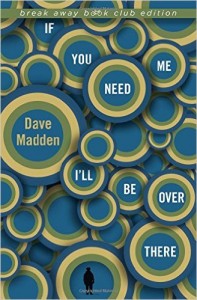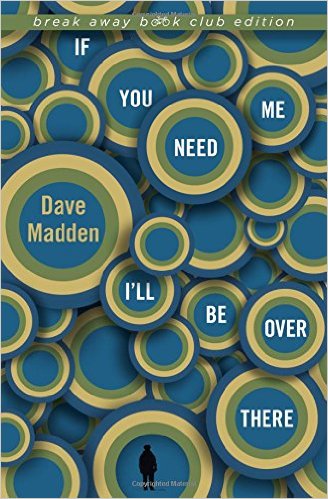 If You Need Me I’ll Be Over There
If You Need Me I’ll Be Over There
by Dave Madden
Indiana. 188 pages, $16.
“‘IT’S COOL you’re gay, man,’ Nathan said. ‘Sucks you have to come out in Lincoln, Nebraska.’” Thus goes the bar talk in Dave Madden’s eye-catching essay of a few years back, “Meme 12.” With his slim but powerful short story collection, If You Need Me I’ll Be Over There, Madden expands upon this theme, the geography of coming out, along with numerous other territories of family life and marriage, both gay and straight.
Madden, in his late thirties, holds a doctorate in creative writing and teaches at the University of San Francisco. His work to date has been nonfiction, and it has won critical acclaim.
The skills of observation and depiction needed for taxidermy would seem useful for writing fiction too, and If You Need Me proves the point. Its stories cover a sweep of experiences. In addition to coming out and marriage, Madden scrutinizes such Americana as guns and football. His characters are seen from the outside, and from the inside too. They come across as singularly alive, their attitudes neither stereotyped nor predictable—yet still recognizable.
The author is openly gay, and gay characters abound. They are not always front and center, however, and fraught relationships in the straight world come in for considerable scrutiny. Most stories take place around Pittsburgh, where the author went to college, or in Nebraska, where he earned his graduate degree. Madden relates them with wry humor and using an engaging first-person voice that’s only slightly less so when the narrator is a woman.
The stories can be disarmingly simple. Like the late David Foster Wallace, whose work he has praised, Madden focuses on everyday emotional turmoil. Like Wallace, he is apt to end stories in the midst of things, incompletely resolved, though with far fewer words and a less bleak outlook. A closer comparison might be with Nebraska writer Jonis Agee, with whom Madden studied. Like her, he shows the compromises people make to avoid despair, though his style is more reflective.
If the stories are plain, If You Need Me nevertheless has an intricate structure. Three stories bear the same title as the book, and they describe a kind of backstory for the whole. Christopher, or “Buddy,” narrates the linked tales, which offer snapshots of his experience in coming to accept himself as gay. Anguish and frustration are apparent: “All my life, I’d never seen art that was about me,” Buddy states. “No books about second-born who had to fight for attention. No movies about uptight nerds who wouldn’t admit they’re gay. When my type showed up in stories, we had to change or we got sacrificed.” The “second-born” is vintage Madden—a lament that sticks out because (unlike the others) it can’t be imputed to a homophobic hetero world.
The pain of coming out is apparent in several non-linked stories as well. “Smear the Queer,” for example, riffs on the odious name of an actual kids’ game to dramatize the high cost of being different. Here, Jim, smallest and least aggressive of four brothers, compensates for poor athletic ability by memorizing football stats and reeling them off to family and friends so that they will perceive him as a “regular guy.” He picks a “tough” college major, chemistry, to strengthen the case, and only comes to act on his attraction to men after graduation. Three years later he is devastated by a call from a former lover who divulges that he has AIDS. Things spin out of control. Jim tests seropositive and is fired from his job. He begins aggressive antiretroviral therapy, musing that he has been forced “to track T cell counts like [he]once tracked rushing yards and QB ratings.”
Madden describes affection between fathers and their gay sons with subtlety and sureness. In the same story, when an exhausted Jim returns home for a family party, his father convinces him to join a football game as his own replacement, a gesture that revives his son. “I assured my brothers I could play,” says Jim, “and assured Bill, my teammate, we would win. … I remember feeling good about being outside.” The reaction calls to mind Madden’s account in The Authentic Animal of how he had been drawn to study taxidermy. Growing up, he found a miniature plastic moose in the attic that had belonged to his father as a boy. “I took it for my own,” the writer states, “and hung it on the wall as a kind of badge that read i am my father’s son.”
Some stories describe crushing challenges. “Another Man’s Treasure,” for example, is the tale of an assertively queer boy who’s pushed off a water tower to his death. The severed cat’s tail left on his body points to the bullying son of a garbage collector-cum-sheriff as culprit. In “We All Have Difficult Jobs,” a gay concierge is displaced by a kiosk, or “e-concierge.” He takes refuge in religion—only to drive away his life partner, who was once molested by a priest and cannot abide living with a devout Catholic.
Madden’s tales reverberate with dry humor and allow for shifts in perspective. The last linked story, for instance, takes place after Buddy and Dean have married, at the baptism of Dean’s godchild. Annoyed at having to be there, Buddy pelts the clergyman with confrontational questions, until the infant being baptized grows irritable and starts shrieking. Buddy is livid with Dean for putting them in this situation, then stops himself. “Ten years together and I can’t think of a single time he’s embarrassed me,” he reflects. “I’ve leaned on him like a hip I prefer.”
Yet it’s not as though Madden’s gay characters are paragons of goodness, or the straight world filled with irredeemable bigots. Instead, the writer displays a spectrum of human beings and circumstances, filling out their oddities and eccentricities, including the darker ones. He looks at these characters from multiple angles, in their own skin, and takes them at their word. The stories in this absorbing collection reveal antagonisms and brutality—but signs of kinship and reciprocity are detectable too, as in real life.
Rosemary Booth, a frequent contributor, is a writer and photographer living in Cambridge, Mass.






